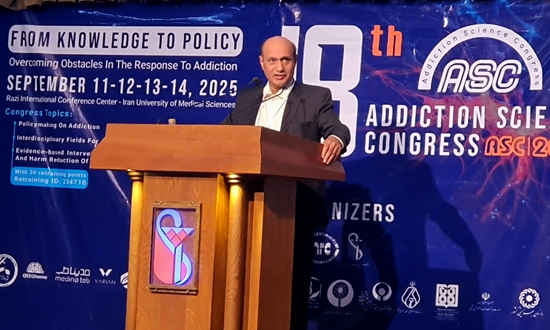Insights from Dr. Mohammad Taghi Joghataei at Congress on Addiction
Understanding Addiction as a Complex Brain Disorder

Dr. Mohammad Taghi Joghataie, Chairman of the 18th Congress on Addiction Science, has underscored the intricate nature of addiction, identifying it as the second most significant health challenge facing the country. He described addiction as a complex disorder that disrupts the functioning of brain networks and necessitates multifaceted and specialized interventions.
According to the Public Relations Department of the Iran University of Medical Sciences, Dr. Joghataei made these remarks during the opening session of the congress. He acknowledged that while considerable efforts have been made in the field of addiction in Iran, including the dedication of numerous researchers and healthcare professionals, addiction remains a critical societal issue. He noted, "If not for these efforts, the situation could undoubtedly be more dire."
Dr. Joghataei elaborated on the various factors contributing to the prevalence of addiction globally. These include individual psychological factors such as depression and anxiety, social determinants like poverty and unemployment, environmental and cultural elements that facilitate easy access to drugs, biological and genetic predispositions that influence the brain's response to substances, and commercial factors including organized drug marketing and trafficking.
He further explained the concept of brain networks, stating, "Every behavior is mediated by specific networks in the brain. In the case of addiction, one or more of these networks become disrupted." Recent research indicates that nearly 30 to 40 brain regions are implicated in individuals with addiction, which significantly complicates the disorder.
Dr. Joghataei highlighted key brain networks affected by addiction, including those responsible for reward, decision-making, emotion, learning, and self-awareness (the default mode network). He explained that drug use leads to a sharp increase in dopamine levels, creating a false sense of pleasure that compels individuals to seek out substances compulsively. This process diminishes their ability to resist temptation and weakens their capacity for self-control.
He continued by noting that emotional regulation is impaired in individuals with addiction, leading to severe difficulties when confronted with stress. The impact of substances on the learning and memory networks also contributes to heightened cravings when exposed to drug-related cues, such as familiar friends, locations, or even specific smells.
Dr. Joghataei emphasized the significance of the default mode network, which is crucial for self-awareness and cognitive processing. In individuals with addiction, this network becomes incoherent and hyperactive, resulting in increased rumination and drug cravings.
In conclusion, he stated, "These insights demonstrate that addiction is not merely a matter of willpower; it is a complex disorder rooted in the dysfunction of brain networks that requires comprehensive and specialized treatment approaches." Dr. Joghataei reiterated the importance of recognizing addiction as the second leading health issue in the country, urging stakeholders to move beyond superficial interventions and address the deeper neurological and societal roots of the problem.
It is worth noting that the 18th Congress on Addiction Science commenced on the morning of September 2, 2025, at the Razi Conference Center and will continue for four days until Friday, September 5. The theme of this year's congress is "From Knowledge to Policymaking: Overcoming Obstacles to Responding to Addiction."


comment